四级仔细阅读练习group1
- 格式:doc
- 大小:52.00 KB
- 文档页数:6
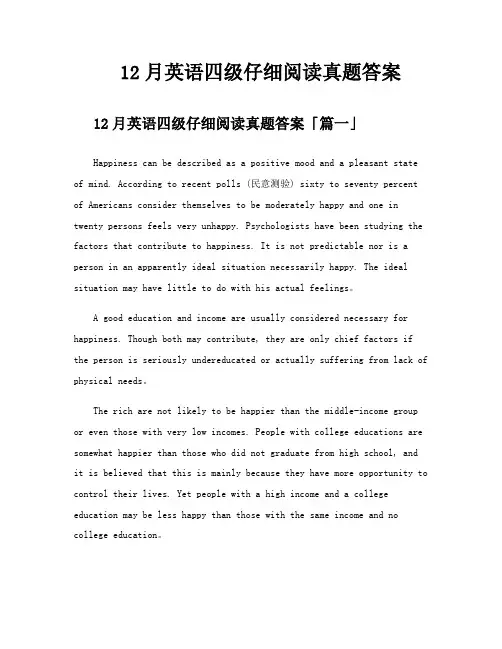
12月英语四级仔细阅读真题答案12月英语四级仔细阅读真题答案「篇一」Happiness can be described as a positive mood and a pleasant state of mind. According to recent polls (民意测验) sixty to seventy percent of Americans consider themselves to be moderately happy and one in twenty persons feels very unhappy. Psychologists have been studying the factors that contribute to happiness. It is not predictable nor is a person in an apparently ideal situation necessarily happy. The ideal situation may have little to do with his actual feelings。
A good education and income are usually considered necessary for happiness. Though both may contribute, they are only chief factors if the person is seriously undereducated or actually suffering from lack of physical needs。
The rich are not likely to be happier than the middle-income group or even those with very low incomes. People with college educations are somewhat happier than those who did not graduate from high school, and it is believed that this is mainly because they have more opportunity to control their lives. Yet people with a high income and a college education may be less happy than those with the same income and no college education。
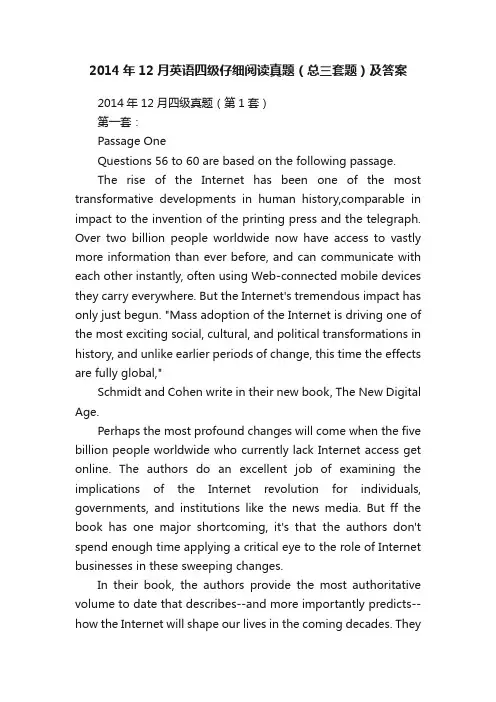
2014年12月英语四级仔细阅读真题(总三套题)及答案2014年12月四级真题(第1套)第一套:Passage OneQuestions 56 to 60 are based on the following passage.The rise of the Internet has been one of the most transformative developments in human history,comparable in impact to the invention of the printing press and the telegraph. Over two billion people worldwide now have access to vastly more information than ever before, and can communicate with each other instantly, often using Web-connected mobile devices they carry everywhere. But the Internet's tremendous impact has only just begun. "Mass adoption of the Internet is driving one of the most exciting social, cultural, and political transformations in history, and unlike earlier periods of change, this time the effects are fully global,"Schmidt and Cohen write in their new book, The New Digital Age.Perhaps the most profound changes will come when the five billion people worldwide who currently lack Internet access get online. The authors do an excellent job of examining the implications of the Internet revolution for individuals, governments, and institutions like the news media. But ff the book has one major shortcoming, it's that the authors don't spend enough time applying a critical eye to the role of Internet businesses in these sweeping changes.In their book, the authors provide the most authoritative volume to date that describes--and more importantly predicts--how the Internet will shape our lives in the coming decades. Theypaint a picture of a world in which individuals, companies, institutions, and governments must deal with two realities,one physical, and one virtual. At the core of the book is the idea that"technology is neutral, but people aren't." By using this concept as a starting point, the authors aim to move beyond the now familiar optimist vs. pessimist dichotomy (对立观点) that has characterized many recent debates about whether the rise of the Internet will ultimately be good or bad for society. In an interview with TIME earlier this week, Cohen said although he and his co-author are optimistic about many aspects of the Internet, they're also realistic about the risks and dangers that lie ahead when the next five billion people come online, particularly with respect to personal privacy and state surveillance (监视).注意:此部分试题请在答题卡2上作答。
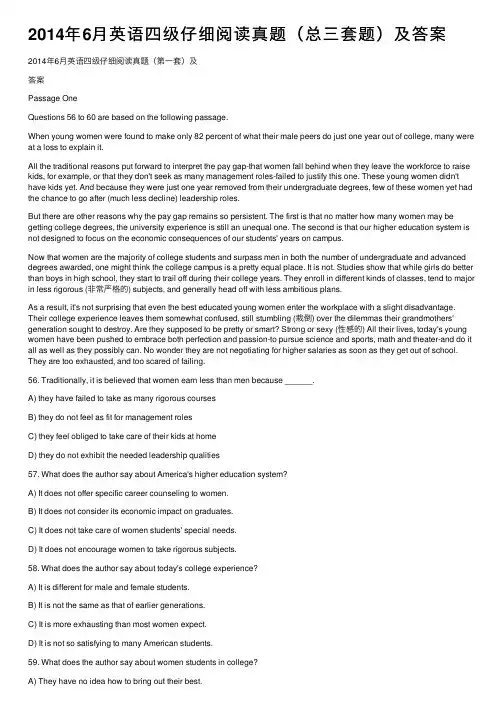
2014年6⽉英语四级仔细阅读真题(总三套题)及答案2014年6⽉英语四级仔细阅读真题(第⼀套)及答案Passage OneQuestions 56 to 60 are based on the following passage.When young women were found to make only 82 percent of what their male peers do just one year out of college, many were at a loss to explain it.All the traditional reasons put forward to interpret the pay gap-that women fall behind when they leave the workforce to raise kids, for example, or that they don't seek as many management roles-failed to justify this one. These young women didn't have kids yet. And because they were just one year removed from their undergraduate degrees, few of these women yet had the chance to go after (much less decline) leadership roles.But there are other reasons why the pay gap remains so persistent. The first is that no matter how many women may be getting college degrees, the university experience is still an unequal one. The second is that our higher education system is not designed to focus on the economic consequences of our students' years on campus.Now that women are the majority of college students and surpass men in both the number of undergraduate and advanced degrees awarded, one might think the college campus is a pretty equal place. It is not. Studies show that while girls do better than boys in high school, they start to trail off during their college years. They enroll in different kinds of classes, tend to major in less rigorous (⾮常严格的) subjects, and generally head off with less ambitious plans.As a result, it's not surprising that even the best educated young women enter the workplace with a slight disadvantage. Their college experience leaves them somewhat confused, still stumbling (栽倒) over the dilemmas their grandmothers' generation sought to destroy. Are they supposed to be pretty or smart? Strong or sexy (性感的) All their lives, today's young women have been pushed to embrace both perfection and passion-to pursue science and sports, math and theater-and do it all as well as they possibly can. No wonder they are not negotiating for higher salaries as soon as they get out of school. They are too exhausted, and too scared of failing.56. Traditionally, it is believed that women earn less than men because ______.A) they have failed to take as many rigorous coursesB) they do not feel as fit for management rolesC) they feel obliged to take care of their kids at homeD) they do not exhibit the needed leadership qualities57. What does the author say about America's higher education system?A) It does not offer specific career counseling to women.B) It does not consider its economic impact on graduates.C) It does not take care of women students' special needs.D) It does not encourage women to take rigorous subjects.58. What does the author say about today's college experience?A) It is different for male and female students.B) It is not the same as that of earlier generations.C) It is more exhausting than most women expect.D) It is not so satisfying to many American students.59. What does the author say about women students in college?A) They have no idea how to bring out their best.B) They drop a course when they find it too rigorous.C) They are not as practical as men in choosing courses.D) They don't perform as well as they did in high school.60. How does the author explain the pay gap between men and women fresh from college?A) Women are too worn out to be ambitious.B) Women are not ready to take management roles.C) Women are caught between career and family.D) Women are not good at negotiating salaries.Passage TwoQuestions 61 to 65 are based on the following passage.Heading leadership literature, you'd sometimes think that everyone has the potential to be an effective leader.I don't believe that to be true. In fact, I see way fewer truly effective leaders than I see people stuck in positions of leadership who are sadly incompetent and seriously misguided about their own abilities.Part of the reason this happens is a lack of honest self-assessment by those who aspire to (追求) leadership in the first place.We've all met the type of individual who simply must take charge. Whether it's a decision-making session, a basketball game, or a family outing, they can't help grabbing the lead dog position and clinging on to it for dear life. They believe they're natural born leaders.Truth is, they're nothing of the sort. True leaders don't assume that it's their divine (神圣的) right, to take charge every time two or more people get together. Quite the opposite. A great leader will assess each situation on its merits, and will only take charge when their position, the situation, and/or the needs of the moment demand it.Many business executives confuse leadership with action. They believe that constant motion somehow generates leadership as a byproduct. Faced with any situation that can't be solved by the sheer force of activity, they generate a dust cloud of impatience. Their one leadership tool is volume: if they think you aren't working as hard as they think you should, their demands become increasingly louder and harsher.True leaders understand the value of action, of course, but it isn't their only tool. In fact, it isn't even their primary tool. Great leaders see more than everyone else: answers, solutions, patterns, problems, opportunities. They know it's vitally important to do, but they also know that thinking, understanding, reflection and interpretation are equally important.If you're too concerned with outcomes to the extent that you manipulate and intimidate others to achieve those outcomes, then you aren't leading at all, you're dictating. A true leader is someone who develops his or her team so that they can and do hit their targets and achieve their goals.注意:此部分试题请在答题卡2上作答。
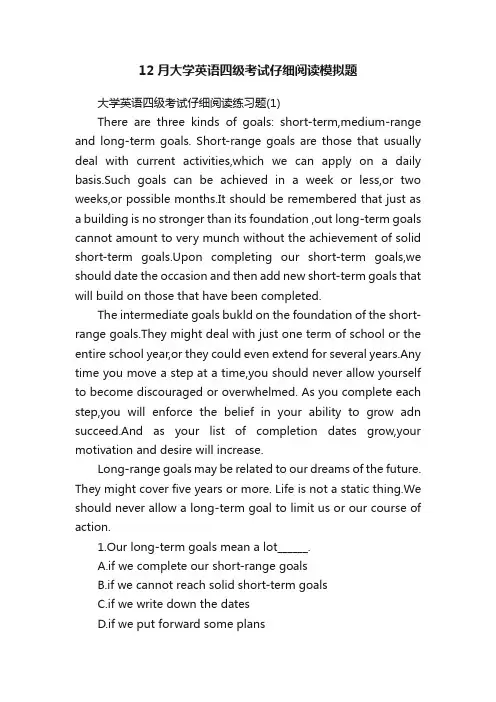
12月大学英语四级考试仔细阅读模拟题大学英语四级考试仔细阅读练习题(1)There are three kinds of goals: short-term,medium-range and long-term goals. Short-range goals are those that usually deal with current activities,which we can apply on a daily basis.Such goals can be achieved in a week or less,or two weeks,or possible months.It should be remembered that just as a building is no stronger than its foundation ,out long-term goals cannot amount to very munch without the achievement of solid short-term goals.Upon completing our short-term goals,we should date the occasion and then add new short-term goals that will build on those that have been completed.The intermediate goals bukld on the foundation of the short-range goals.They might deal with just one term of school or the entire school year,or they could even extend for several years.Any time you move a step at a time,you should never allow yourself to become discouraged or overwhelmed. As you complete each step,you will enforce the belief in your ability to grow adn succeed.And as your list of completion dates grow,your motivation and desire will increase.Long-range goals may be related to our dreams of the future. They might cover five years or more. Life is not a static thing.We should never allow a long-term goal to limit us or our course of action.1.Our long-term goals mean a lot______.A.if we complete our short-range goalsB.if we cannot reach solid short-term goalsC.if we write down the datesD.if we put forward some plans2.New short-term goals are bulid upon______.A.two yearsB.long-term goalsC.current activitiesD.the goals that have been completed3.When we complete each step of our goals ,______.A.we will win final successB.we are overwhelmedC.we should build up confidence of successD.we should strong desire for setting new goals4.Once our goals are drawn up,_______.A.we should stick to them until we complete themB.we may change our goals as we have new ideas and opportunitiesC.we had better wait for the exciting news of successD.we have made great decision5.It is implied but not stated in the passage that ______.A.those who habe long-term goals will succeedB.writing down the dates may discourage youC.the goal is only a guide for us to reach our desinationD.every should have a goal答案:adcbc大学英语四级考试仔细阅读练习题(2)The economy of the United states after 1952 was the econnomy of a well-fed,almost fully employed people. Despit occasional alarms, the country escaped any postwar depression and lived in a state of boom. A n economic survey of the year 1955, a typical year of the 1950’s, may be typical as illustrating the rapid economic growth of the decade. The national output was value at 10 percent above that of 1954 (1955 output was estimated at 392 billion dollars). The production of manufacturers was about 40 percent more than it had averagedin the years immediately following World War 2. The country’s business spent about 30billion dollars for new factories and machinery. National income available for spending was almost a third greater than it had been it had been in 1950. Consumers spent about 256 billion dollars; that is about 700 million dollars a day ,or about twenty-five million dollars every hour , all round the clock. Sixty-five million people held jobs and only a little more than two million wanted jobs but could not find them . Only agriculture complained that it was not sharing in the room. To some observers this was an ominous echo of the mid-1920’s . As farmer’s shre of their products declined , marketing costs rose. But there were , among the observers of the national economy, a few who were not as confident as the majority . Those few seemed to fear that the boom could not last and would eventually lead to the oppsite-depression.1. What is the best title of the passage?a. The Agriculatural Trends of 1950’sb. The Unemployment Rate of 1950’sc. U.S. Economy in the 50’sd. The Federal Budget of 19522. In Line 3, the word “boom” could best be replaced by______.a. nearby explosionb. thunderous noisec. general public supportd. rapid economic growth3. It can be inferred the national from the passage that most people in the United States in 1955 viewed the national economy with an air of _________.a. confidenceb. confusionc. disappointmentd. suspicion4. Which of the following were LEAST satisfied with the national economy in the 1950’s?a. Economistsb. Frmaersc. Politiciansd. Steelworkers。
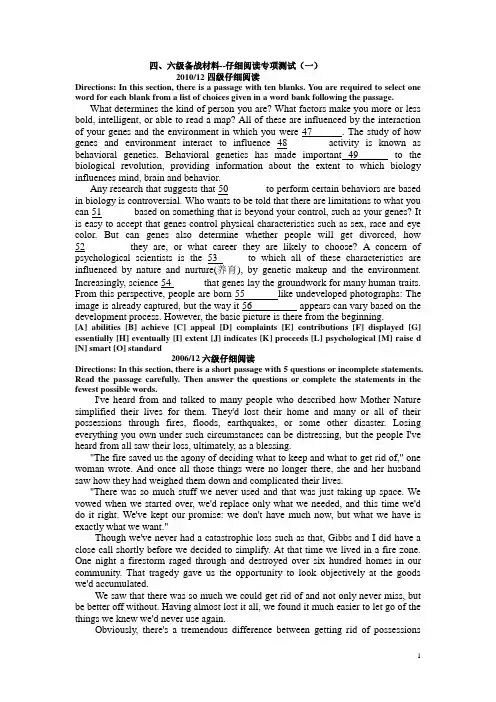
四、六级备战材料--仔细阅读专项测试(一)2010/12四级仔细阅读Directions: In this section, there is a passage with ten blanks. You are required to select one word for each blank from a list of choices given in a word bank following the passage.What determines the kind of person you are? What factors make you more or less bold, intelligent, or able to read a map? All of these are influenced by the interaction of your genes and the environment in which you were 47______. The study of how genes and environment interact to influence 48_______ activity is known as behavioral genetics. Behavioral genetics has made important 49______ to the biological revolution, providing information about the extent to which biology influences mind, brain and behavior.Any research that suggests that 50_______ to perform certain behaviors are based in biology is controversial. Who wants to be told that there are limitations to what you can 51______ based on something that is beyond your control, such as your genes? It is easy to accept that genes control physical characteristics such as sex, race and eye color. But can genes also determine whether people will get divorced, how 52________ they are, or what career they are likely to choose? A concern of psychological scientists is the 53 _____to which all of these characteristics are influenced by nature and nurture(养育), by genetic makeup and the environment. Increasingly, science 54 ______that genes lay the groundwork for many human traits. From this perspective, people are born 55 ______like undeveloped photographs: The image is already captured, but the way it 56_________ appears can vary based on the development process. However, the basic picture is there from the beginning.[A] abilities [B] achieve [C] appeal [D] complaints [E] contributions [F] displayed [G] essentially [H] eventually [I] extent [J] indicates [K] proceeds [L] psychological [M] raise d [N] smart [O] standard2006/12六级仔细阅读Directions: In this section, there is a short passage with 5 questions or incomplete statements. Read the passage carefully. Then answer the questions or complete the statements in the fewest possible words.I've heard from and talked to many people who described how Mother Nature simplified their lives for them. They'd lost their home and many or all of their possessions through fires, floods, earthquakes, or some other disaster. Losing everything you own under such circumstances can be distressing, but the people I've heard from all saw their loss, ultimately, as a blessing."The fire saved us the agony of deciding what to keep and what to get rid of," one woman wrote. And once all those things were no longer there, she and her husband saw how they had weighed them down and complicated their lives."There was so much stuff we never used and that was just taking up space. We vowed when we started over, we'd replace only what we needed, and this time we'd do it right. We've kept our promise: we don't have much now, but what we have is exactly what we want."Though we've never had a catastrophic loss such as that, Gibbs and I did have a close call shortly before we decided to simplify. At that time we lived in a fire zone. One night a firestorm raged through and destroyed over six hundred homes in our community. That tragedy gave us the opportunity to look objectively at the goods we'd accumulated.We saw that there was so much we could get rid of and not only never miss, but be better off without. Having almost lost it all, we found it much easier to let go of the things we knew we'd never use again.Obviously, there's a tremendous difference between getting rid of possessionsand losing them through a natural disaster without having a say in the matter. And this is not to minimize the tragedy and pain such a loss can generate.But you might think about how you would approach the acquisition process if you had it to do all over again. Look around your home and make a list of what you would replace.Make another list of things you wouldn't acquire again no matter what, and in fact would be happy to be rid of.When you're ready to start unloading some of your stuff, that list will be a good place to start.47. Many people whose possessions were destroyed in natural disasters eventually considered their loss_______________.48. Now that all their possessions were lost in the fire, the woman and her husband felt that their lives had been ______________.49. What do we know about the author's house from the sentence. "Gibbs and I did have a close call..."(Lines 1-2, Para.4)?50. According to the author, getting rid of possessions and losing them through a natural disaster are vastly ________________.51. What does the author suggest people do with unnecessary things?词类转换练习(2)1. He was leading a life of _______in Australia. (luxurious)2. It was an ________of enthusiasm that caused the problem. (excessive)3. She devoted her life to the ________of pleasure. (pursue)4. After lunch we went for a ________ stroll. (leisure)5. My teaching style is _________ to that of most other teachers.(similarity)6. Language is a social and cultural ________. (phenomena)7. His speech gave us an _______ into the problems of education. (insightful)8. Refugees everywhere lead ________ lives. (misery)9. They had a _______escape when their car plunged into a river. (miracle)10. Many economists are _______of the government's economic policies. (criticism)11. What experience do you have that is ________to this position? (relevance)12. The nation's ________of coal decreased continuously last year. (consume)13. Standards of _______seem to be dropping. (moral)14. After her mother's death, she became acutely aware of her own _______. (mortal)15. ________ to our small flat, Bill's house seemed like a palace. (comparison)16. The hotel charges $20 a day, ________of meals. (exclude)17. Judith lay on the sofa, _______ in her book. (absorption)18. Philosophers did not use to make a ________between arts and science. (distinct)19. The curriculum will take account of the ethnic ______of the population. (diverse)20. I'm not really _______ with her poetry, sorry to say. (familiarity)21. ________ he failed the exam, because he was lazy. (inevitable)22. They questioned the _______of the information in the file.(accurate)23. He _______ that an earthquake was imminent. (prediction)24. The year 1849 _______ a great war in Hungary. (witness)25. The car has its drawbacks and it has its ______. (virtuous)26. He tried to exercise an ______ influence upon his colleagues. (due)27. Crime has increased on an _________ scale. (precedent)28. Bob has a _______ to exaggerate things. (tend)29. They are trying to find a better way of _______ energy. (transmission)30. I can ________ with those who have lost loved ones. (sympathy)31. The _______ of fruit was caused by the drought. (scarce)32. We need _______ time to deal with the problem. (sufficiency)33. She's as ______ as an eel. (slip)34. Her interest in art was _______ by her father. (stimulation)35. Your computer is far _________ to mine. (superiority)。
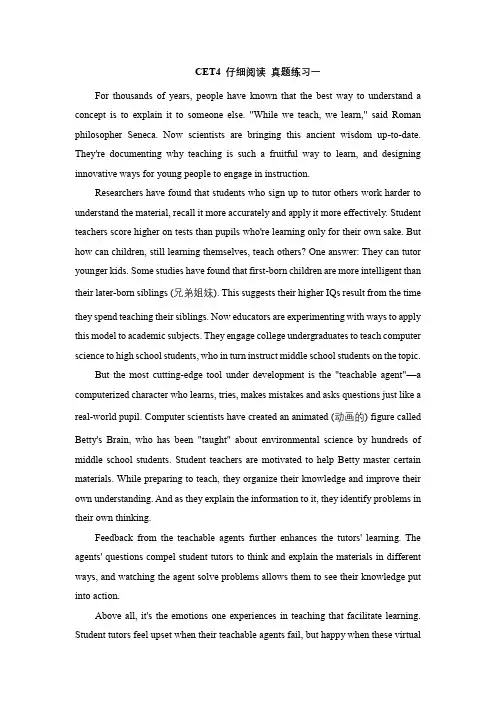
CET4 仔细阅读真题练习一For thousands of years, people have known that the best way to understand a concept is to explain it to someone else. "While we teach, we learn," said Roman philosopher Seneca. Now scientists are bringing this ancient wisdom up-to-date. They're documenting why teaching is such a fruitful way to learn, and designing innovative ways for young people to engage in instruction.Researchers have found that students who sign up to tutor others work harder to understand the material, recall it more accurately and apply it more effectively. Student teachers score higher on tests than pupils who're learning only for their own sake. But how can children, still learning themselves, teach others? One answer: They can tutor younger kids. Some studies have found that first-born children are more intelligent than their later-born siblings (兄弟姐妹). This suggests their higher IQs result from the time they spend teaching their siblings. Now educators are experimenting with ways to apply this model to academic subjects. They engage college undergraduates to teach computer science to high school students, who in turn instruct middle school students on the topic.But the most cutting-edge tool under development is the "teachable agent"—a computerized character who learns, tries, makes mistakes and asks questions just like a real-world pupil. Computer scientists have created an animated (动画的) figure called Betty's Brain, who has been "taught" about environmental science by hundreds of middle school students. Student teachers are motivated to help Betty master certain materials. While preparing to teach, they organize their knowledge and improve their own understanding. And as they explain the information to it, they identify problems in their own thinking.Feedback from the teachable agents further enhances the tutors' learning. The agents' questions compel student tutors to think and explain the materials in different ways, and watching the agent solve problems allows them to see their knowledge put into action.Above all, it's the emotions one experiences in teaching that facilitate learning. Student tutors feel upset when their teachable agents fail, but happy when these virtualpupils succeed as they derive pride and satisfaction from someone else's accomplishment.46. What are researchers rediscovering through their studies?A) Seneca's thinking is still applicable today.B) Better learners will become better teachers.C) Human intelligence tends to grow with age.D) Philosophical thinking improves instruction.47. What do we learn about Betty's Brain?A) It is a character in a popular animation.B) It is a teaching tool under development.C) It is a cutting-edge app in digital games.D) It is a tutor for computer science students.48. How does teaching others benefit student tutors?A) It makes them aware of what they are strong at.B) It motivates them to try novel ways of teaching.C) It helps them learn their academic subjects better.D) It enables them to better understand their teachers.49. What do students do to teach their teachable agents?A) They motivate them to think independently.B) They ask them to design their own questions.C) They encourage them to give prompt feedback.D) They use various ways to explain the materials.50. What is the key factor that eases student tutors' learning?A) Their sense of responsibility.B) Their emotional involvement.C) The learning strategy acquired.D) The teaching experience gained.。
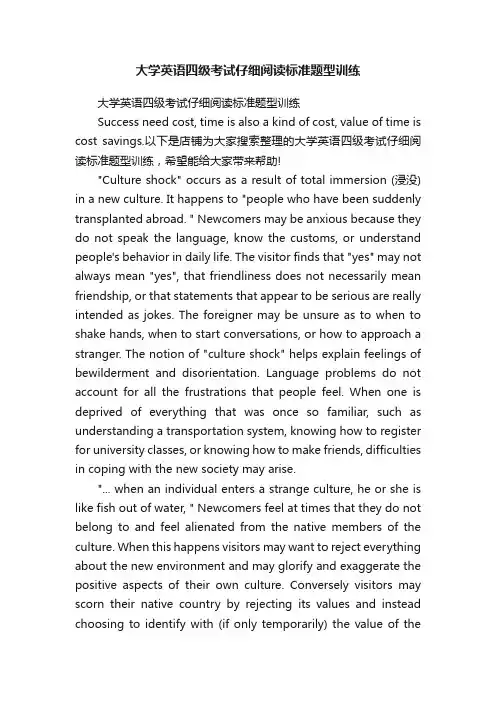
大学英语四级考试仔细阅读标准题型训练大学英语四级考试仔细阅读标准题型训练Success need cost, time is also a kind of cost, value of time is cost savings.以下是店铺为大家搜索整理的大学英语四级考试仔细阅读标准题型训练,希望能给大家带来帮助!"Culture shock" occurs as a result of total immersion (浸没) in a new culture. It happens to "people who have been suddenly transplanted abroad. " Newcomers may be anxious because they do not speak the language, know the customs, or understand people's behavior in daily life. The visitor finds that "yes" may not always mean "yes", that friendliness does not necessarily mean friendship, or that statements that appear to be serious are really intended as jokes. The foreigner may be unsure as to when to shake hands, when to start conversations, or how to approach a stranger. The notion of "culture shock" helps explain feelings of bewilderment and disorientation. Language problems do not account for all the frustrations that people feel. When one is deprived of everything that was once so familiar, such as understanding a transportation system, knowing how to register for university classes, or knowing how to make friends, difficulties in coping with the new society may arise."... when an individual enters a strange culture, he or she is like fish out of water, " Newcomers feel at times that they do not belong to and feel alienated from the native members of the culture. When this happens visitors may want to reject everything about the new environment and may glorify and exaggerate the positive aspects of their own culture. Conversely visitors may scorn their native country by rejecting its values and instead choosing to identify with (if only temporarily) the value of thenew country. This may occur as an attempt to over-identify with the new culture in order to be accepted by the people in it.26. The expression "he or she is like fish out of water" suggests_______.A. people away from their cultures can hardly survive in a new cultureB. a fish can not survive without waterC. people away from their culture experience mental isolationD. people away from their culture have difficulties in their studies27. In order to identify with the new environment, some people may_______.A. give an exaggerated picture of their own countryB. criticize the positive aspects of their own countryC. abandon their original beliefsD. accept a temporary set of values28. Which of the following statements is TRUE according to the author?A. Homesickness results in culture shock.B. A typical symptom of culture shock is confusion.C. Culture shock is the explanation of anxiety.D. Culture shock happens to foreign students only.29. Newcomers may worry aboutA. their ignorance of the alien customsB. their knowledge of "yes" in the native languageC. their understanding of friendshipD. their control of their behavior30. When the foreign visitor is immersed in new problems he finds hard to cope with, he is most likely to feel_______.A. uninsuredB. deprivedC. alienatedD. disappointed 参考答案26. C 27. B 28. B 29. A 30. C。
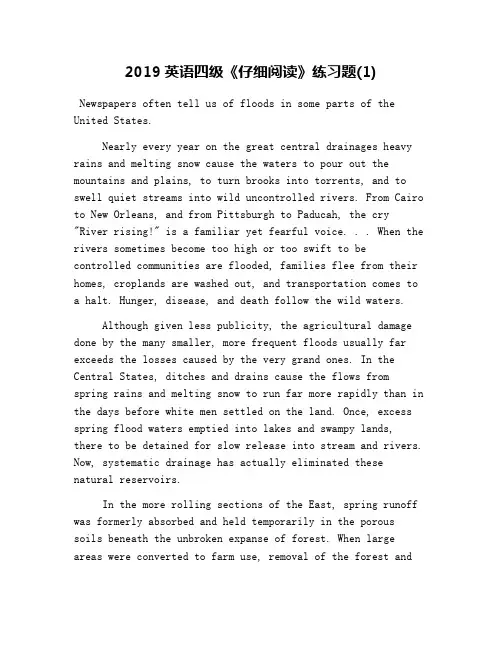
2019英语四级《仔细阅读》练习题(1)Newspapers often tell us of floods in some parts of the United States.Nearly every year on the great central drainages heavy rains and melting snow cause the waters to pour out the mountains and plains, to turn brooks into torrents, and to swell quiet streams into wild uncontrolled rivers. From Cairo to New Orleans, and from Pittsburgh to Paducah, the cry "River rising!" is a familiar yet fearful voice. . . When the rivers sometimes become too high or too swift to becontrolled communities are flooded, families flee from their homes, croplands are washed out, and transportation comes to a halt. Hunger, disease, and death follow the wild waters.Although given less publicity, the agricultural damage done by the many smaller, more frequent floods usually far exceeds the losses caused by the very grand ones. In the Central States, ditches and drains cause the flows from spring rains and melting snow to run far more rapidly than in the days before white men settled on the land. Once, excess spring flood waters emptied into lakes and swampy lands, there to be detained for slow release into stream and rivers. Now, systematic drainage has actually eliminated thesenatural reservoirs.In the more rolling sections of the East, spring runoff was formerly absorbed and held temporarily in the poroussoils beneath the unbroken expanse of forest. When large areas were converted to farm use, removal of the forest andthe practice of up-and-down hill plowing deprived the soils of much of their ability to catch and store water.The effects of eliminating the natural forest cover are shown in the gullied farm lands and widened stream channels found in some densely settled areas. Partly because the stream channels are more or less filled with material washed down from the uplands, and partly because storm runoff has increased, the channels are today no longer able to carry all the flow from heavy rains. This explains why the streams overtop banks far more often than in the days before settlement.26. The best title for the selection would be______.A. River Rising! River Rising!B. Forests and FloodsC. Flooding in the U. S.D. The Results of Flooding27. All of the following cause floods EXCEPT______.A. heavy rainB. melting snowC. increasing storm runoffD. porous soil28. The author states that______.A. lakes and swamps once acted like natural reservoirsB. up-and-down hill plowing catches and stores waterC. stream channels are the best carriers of waterD. floods are easily prevented and controlled29. According to the selection, streams overtop their banks partly because______.A. material from higher land is washed into themB. ditches and drains lead into themC. rivers become too swiftD. snow melts more rapidly nowadays30. The floods which are given most publicity______.A. cause no damageB. cause the most damageC. cause less agricultural damage than the many smaller, more frequent floodsD. far exceed the smaller, more frequent floods in agricultural loss答案:26. C 27. D 28. A 29. A 30. C。
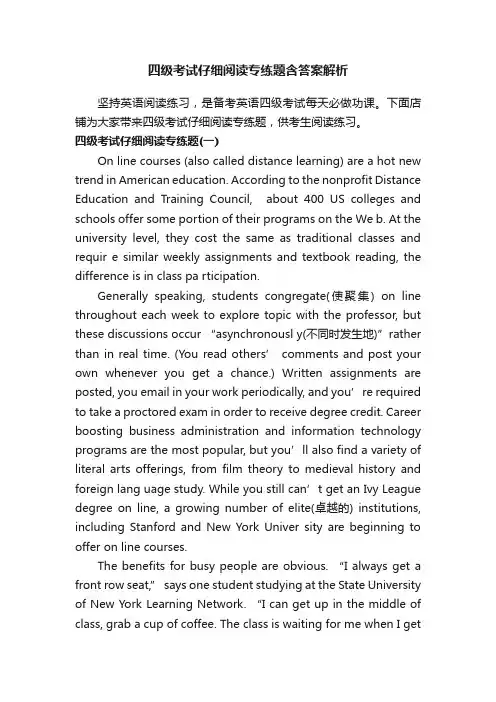
四级考试仔细阅读专练题含答案解析坚持英语阅读练习,是备考英语四级考试每天必做功课。
下面店铺为大家带来四级考试仔细阅读专练题,供考生阅读练习。
四级考试仔细阅读专练题(一)On line courses (also called distance learning) are a hot new trend in American education. According to the nonprofit Distance Education and Training Council, about 400 US colleges and schools offer some portion of their programs on the We b. At the university level, they cost the same as traditional classes and requir e similar weekly assignments and textbook reading, the difference is in class pa rticipation.Generally speaking, students congregate(使聚集) on line throughout each week to explore topic with the professor, but these discussions occur “asynchronousl y(不同时发生地)”rather than in real time. (You read others’ comments and post your own whenever you get a chance.) Written assignments are posted, you email in your work periodically, and you’re required to take a proctored exam in order to receive degree credit. Career boosting business administration and information technology programs are the most popular, but you’ll also find a variety of literal arts offerings, from film theory to medieval history and foreign lang uage study. While you still can’t get an Ivy League degree on line, a growing number of elite(卓越的) institutions, including Stanford and New York Univer sity are beginning to offer on line courses.The benefits for busy people are obvious. “I always get a front row seat,” says one student studying at the State University of New York Learning Network. “I can get up in the middle of class, grab a cup of coffee. The class is waiting for me when I getback, and I haven’t missed a thing.” On the other hand, some students miss the face to face interaction that often sparks interest and involvement.36.Generally speaking, on line education costs ____.A.more than the traditional oneB.less than the traditional oneC.as much as the traditional oneD.the author hasn’t mentioned37.The major way to hand out assignments of on line students is ____.A.to hand out them in personB.to post themC.to email in themD.to let the teacher enter into their personal main pages38.Which kind of program is probably NOT welcomed by most of the students?A.Software development.B.Decoration and design.C.International trade.pany management.39.The closest meaning of “Ivy League” (Par. 2) ____.A.famous universities in USAB.famous business colleges in USAC.famous companies in USAD.universities with a long history40.It is implied that in USA ____.A.on line education will take the place of the traditional one soonB.there are only a few on line programs until nowC.one need not take part in the exam in order to receive a diploma by way of online educationD.one can not receive a degree certificate of New York University through distant learning四级考试仔细阅读专练题答案36.答案C。
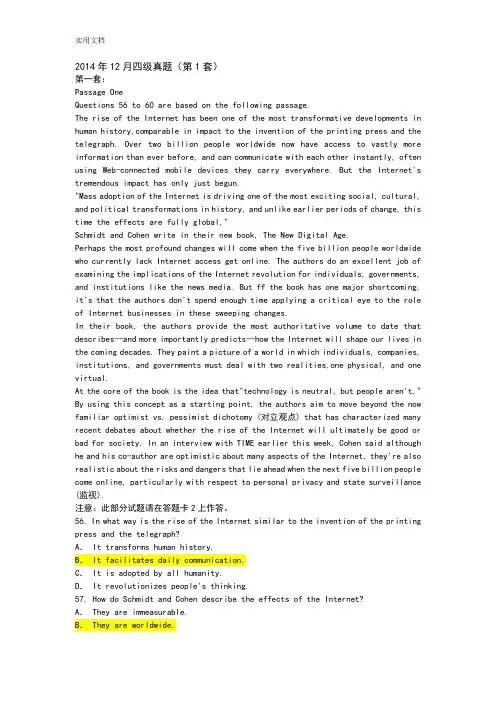
2014年12月四级真题(第1套)第一套:Passage OneQuestions 56 to 60 are based on the following passage.The rise of the Internet has been one of the most transformative developments in human history,comparable in impact to the invention of the printing press and the telegraph. Over two billion people worldwide now have access to vastly more information than ever before, and can communicate with each other instantly, often using Web-connected mobile devices they carry everywhere. But the Internet's tremendous impact has only just begun."Mass adoption of the Internet is driving one of the most exciting social, cultural, and political transformations in history, and unlike earlier periods of change, this time the effects are fully global,"Schmidt and Cohen write in their new book, The New Digital Age.Perhaps the most profound changes will come when the five billion people worldwide who currently lack Internet access get online. The authors do an excellent job of examining the implications of the Internet revolution for individuals, governments, and institutions like the news media. But ff the book has one major shortcoming, it's that the authors don't spend enough time applying a critical eye to the role of Internet businesses in these sweeping changes.In their book, the authors provide the most authoritative volume to date that describes--and more importantly predicts--how the Internet will shape our lives in the coming decades. They paint a picture of a world in which individuals, companies, institutions, and governments must deal with two realities,one physical, and one virtual.At the core of the book is the idea that"technology is neutral, but people aren't." By using this concept as a starting point, the authors aim to move beyond the now familiar optimist vs. pessimist dichotomy (对立观点) that has characterized many recent debates about whether the rise of the Internet will ultimately be good or bad for society. In an interview with TIME earlier this week, Cohen said although he and his co-author are optimistic about many aspects of the Internet, they're also realistic about the risks and dangers that lie ahead when the next five billion people come online, particularly with respect to personal privacy and state surveillance (监视).注意:此部分试题请在答题卡2上作答。
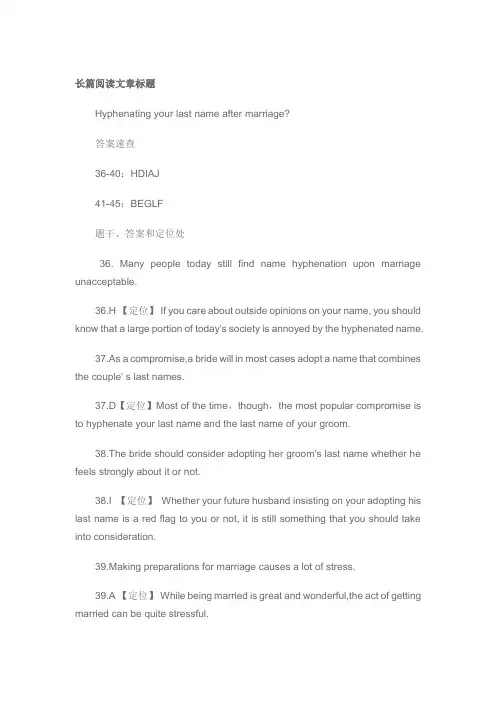
长篇阅读文章标题Hyphenating your last name after marriage?答案速查36-40:HDIAJ41-45:BEGLF题干、答案和定位处36. Many people today still find name hyphenation upon marriage unacceptable.36.H 【定位】If you care about outside opinions on your name, you should know that a large portion of today's society is annoyed by the hyphenated name.37.As a compromise,a bride will in most cases adopt a name that combines the couple' s last names.37.D【定位】Most of the time,though,the most popular compromise is to hyphenate your last name and the last name of your groom.38.The bride should consider adopting her groom's last name whether he feels strongly about it or not.38.I 【定位】Whether your future husband insisting on your adopting his last name is a red flag to you or not, it is still something that you should take into consideration.39.Making preparations for marriage causes a lot of stress.39.A 【定位】While being married is great and wonderful,the act of getting married can be quite stressful.40.Hyphenating the last names could be a win-win solution should arguments arise about what name to adopt upon marriage.40.J 【定位】One spouse wants a complete name change. The other spouse wants no name change. Hyphenating the two names is a way for each person to,at least a little bit,"win"the argument.41.It used to be considered socially unacceptable for a bride to retain her maiden name.41.B 【定位】The act of keeping her own last name was considered taboo and people' s eyebrows would raise right of their faces...42.The bride who adopts a hyphenated last name after marriage can maintain connections with their past achievements.42.E【定位】It allows you to stay connected to accomplishments that you achieved before you got married.43.Hyphenating names allows the bride to preserve her own identity while respecting tradition.43.G 【定位】At the the time,your name is associated with the identity you' ve built up and hyphenation allows you to respect that while also respecting tradition and your husband's family 's identity.44. No matter what name the bride adopts, it is most important that the newly weds truly love each other.44.L 【定位】At the end of the day,whether you each keep your names,... what matters is that you love each other and are going to be joining your lives together.45.Legally speaking,the bride is free to choose whatever name she prefers.45.F 【定位】While tradition is one thing,there isn' t any logical reason to completely change your name.Passage One文章开头It’s good to be答案46-50: ABDAC46.What do we learn from the passage about the brightest people?A) They can make silly mistakes in straightforward situations.47.What accounts for the existence of intelligent people' s logical blind spots?B) Too much faith in their ability to think.48.How do smart people react when they are found to be wrong?D) They may get offended.49.What may happen to smart people who find it difficult to accept suggestions?A)They may suffer in their professional and private life.50.What is said about those working with or under overachieving people?C) They are under increasing pressure.Passage Two文章开头Of the endless troubles that come with being..答案51-55:DADCB51.Why is the U.S. State Department launching an online learning program for refugees?[D]To help them to meet new employment standards.52.What do we know about "Coursera for Refugees”?A) It provides refugees with a wide range of courses free of charge.53.What does the passage say is a consequence of the global migrant crisis?D)Refugees find it more difficult to get a job.54.What does the author say causes refugees'difficulty in taking online courses?C)Lack of langguage skills55.What did the joint study find about the MOOCs several years ago?B) They benefited most of the learners.。
2021年12月英语四级仔细阅读练习附答案解析第1期Judging from recent surveys,most experts in sleep behavior agree that there is virtually an epidemic (流行病) of sleepiness in the nation. “I can'tthink of a single study that hasn't found Americans getting less sleep thanthey ought to,”says Dr. David. Even people who think they are sleeping enoughwould probably be better off with more rest.The beginning of our sleep-deficit (睡眠不足) crisis can betraced to the invention of the light bulb a century ago. From diary entries andother personal accounts from the 18th and 19th centuries, sleep scientists havereached the conclusion that the average person used to sleep about 9.5 hours anight. “The best sleep habits once were forced on us, when we had nothing to doin the evening down on the farm, and it was dark.” By the 1950s and 1960s, thatsleep schedule had been reduced dramatically, to between 7.5 and eight hours,and most people had to wake to an alarm clock. “People cheat on their sleep,and they don't even realize they're doing it,” says Dr. David. "They thinkthey're okay because they can get by on 6.5hours, when they really need 7.5, eight or even more to feelideallyvigorous."Perhaps the most merciless robber of sleep,researchers say, is the complexity of the day. Whenever pressures from work,family, friends and community mount, many people consider sleep the leastexpensive item on his programme. 'In our society, you're considered dynamic ifyou say you only need 5.5 hours' sleep. If you've got to get 8.5 hours, peoplethink you lack drive and ambition."To determine the consequences of sleep deficit,researchers have put subjects through a set of psychological and performancetests requiring them, for instance, to add columns of numbers or recall apassage read to them only minutes earlier. "We've found that if you're insleep deficit, performance suffers," says Dr. David. “Short-term memory isweakened, as are abilities to make decisions and to concentrate.”1. People in the 18th and 19th centuries used to sleep about 9.5 hoursa night because theyhad _______ .A) no drive and ambition B) noelectric lightingC) the best sleep habits D)nothing to do in the evening2. According to Dr. David, Americans _______ .A) areideally vigorous even under the pressure of lifeB) ofienneglect the consequences of sleep deficitC) do notknow how to relax themselves properlyD) can getby on 6.5 hours of sleep3. Many Americans believe that _______ .A) sleep isthe first thing that can be sacrificed when one is busyB) they needmore sleep to cope with the complexities of everyday lifeC) to sleepis something one can do at any time of the dayD) enoughsleep promotes people's drive and ambition4. The word “subjects” (Line 1, Para. 4) refers to______ .A) the performancetests used in the study of sleep deficitB) specialbranches of knowledge that are being studiedC) peoplewhose behavior or reactions are being studiedD) thepsychological consequences of sleep deficit5. It can be concluded fromthe passage that one should sleep as many hours as is necessary to ______ .A) improveone's memory dramaticallyB) beconsidered dynamic by other peopleC) maintainone's daily scheduleD) feelenergetic and perform adequately1.B答案见第2段第1句。
2018年6月英语四级仔细阅读答案(卷一文都版)Passage One参考答案:46. A. Not all of them are symptoms of dementia.47. C. Communication within our brain weakens.48. A. Totally forgetting how to do ones daily routines。
49. C. Turn to a professional for assistance.50. D. Staying active both physically and mentally答案解析:46.解析:从原文第一段中的说法,如果你有健忘的情况,你可能不需要担心,痴呆的症状和年龄增长引起的健忘之间有明显的不同。
可以得出A. Not all of them are symptoms of dementia. 不是所有的记忆力减退都是痴呆的症状,是正确答案。
47.解析:从原文第三段中的说法,大脑就像身体的其他部位一样会变老,大脑的一些部位会萎缩,尤其是大脑中对于学习,记忆和规划重要的某些部位。
大脑细胞的变化能够影响大脑不同区域的交流。
可以得出C. Communication within our brain weakens. 大脑内部的交流会减弱,是正确选项。
48.解析:从原文第五段中的说法,忘记如何操作家里的东西,比如微波炉,或者忘记如何开车去以前已经拜访过很多次的朋友的家,这都是身体出问题的迹象。
可以得出A. Totally forgetting how to do ones daily routines。
完全忘记如何做日常工作,是正确选项。
49.解析:从原文第七段中的说法,Daffner 建议有严重健忘症状的人去找医生。
可以得出C Turn to a professional for assistance. 向专业人士求助,是正确选项。
英语四级仔细阅读模拟试题附答案英语四级仔细阅读模拟试题1:Fried foods have long been frowned upon. Nevertheless, the skillet (长柄平底煎锅) is about our handiest and most useful piece of kitchen equipment. Strong woodcutters and others engaged in active labor requiring 4,000calories per day or more will take approximately one-third of their rations prepared in this fashion. Meat, eggs, and French toast cooked in this way are served in millions of homes daily. Apparently the consumers are not beset with more signs of indigestion than afflicted by those who insist upon broiling, roasting, or boiling. Some years ago one of our most eminent physiologists investigated the digestibility of fried potatoes. He found that the pan variety was more easily broken down for assimilation than when deep fat was employed. The latter, however, dissolved within the alimentary tract ( 消化道 ) more readily than the boiled type. Furthermore, he learned, by watching the progress of the contents of the stomach by means of the fluoroscope (荧光检查仪), that fat actually accelerated the rate of digestion. Now all this is quite in contrast with "authority". Volumes have been written on nutrition, and everywhere the dictum ( 权威意见) has been accepted--no fried edibles of any sort for children. A few will go so tar as to forbid this style of cooking wholly. Now and then an expert will be bold enough to admit that he uses them himself, the absence of discomfort being explained on the ground that he possesses a powerful gastric ( 胃的 )apparatus. We can ofcourse sizzle perfectly good articles to death so that they will be leathery and tough. But thorough heating, in the presence of shortening, is not the awful crime that it has been labeled. Such dishes stimulate rather than retard contractions of the gall bladder. Thus it is that bile ( 胆汁 ) mixes with the nutriment shortly after it leaves the stomach.We dont need to allow our foodstuffs to become oil soaked, but other than that, there seems to be no basis for the widely heralded prohibition against this method. But notions become fixed. The first condemnation probably rose because an "oracle" ( 圣贤) suffered from dyspepsia (消化不良) which he ascribed to some fried item on the menu. The theory spread. Others agreed with him, and after a time the doctrine became incorporated in our textbooks. The belief is now tradition rather than proved fact. It should have been refuted long since, as experience has demonstrated its falsity.56. This passage focuses on__________.A. why the skillet is a handy piece of kitchen equipmentB. the digestibility of fried foodsC. how the experts can mislead the public in the area of food preparationD. why fried foods have long been frowned upon57. People engaged in active labor eat fried foods because __________.A. they are healthfulB. they are much cheaperC. they can be easily digestedD. they can provide the calories the workers need58. The author implies that the public should__________.A. prepare some foods by fryingB. avoid fried foods if possibleC. fry foods for adults but not for childrenD. prepare all foods by frying59. When the author says that "an oracle suffered from dyspepsia which he ascribed to some fried item on the menu" he is being__________.A. gratefulB. factualC. sarcasticD. humorous60. The passage was probably taken from__________.A. a medical journalB. a publication addressed to the general publicC. a speech at a medical conventionD. an advertisement for cooking oil英语四级仔细阅读模拟试题答案:56.B定位:根据题干信息this passage focuses on可知解答本题需通观全文。
Unit 1 Collapse1B The Collapse of AngkorAlmost hidden amid the forests of northern Cambodia is the scene of one of the greatest vanishing acts of all time. This was once the heart of the Khmer kingdom, which lasted from the 9th to the 15th centuries. At its height, the Khmer Empire dominated much of Southeast Asia, from Myanmar (Burma) in the west to Vietnam in the east. As many as 750,000 people lived in Angkor, its magnificent capital. The most extensive urban complex of the preindustrial world, Angkor stretched across an area the size of New York City. Its greatest temple, Angkor Wat, is the world's largest religious monument even today.Yet when the first European missionaries arrived in Angkor in the late 16th century, they found a city that was already dying. Scholars have come up with a list of suspected causes for Angkor's decline. These include foreign invaders, a religious change of heart, and a shift to maritime trade. But it's mostly guesswork: Roughly 1,300 inscriptions survive on temple doors and monuments, but the people of Angkor left not a single word explaining their kingdom's collapse.Some scholars assume that Angkor died the way it lived: by the sword. The historical records of Ayutthaya, a neighboring state, claim that warriors from that kingdom "took" Angkor in 1431. If so, their motive is not difficult to guess. No doubt Angkor would have been a rich prize: Inscriptions boast that its temple towers were covered with gold. After its rediscovery by Western travelers just over a century ago, historians deduced from Angkor's ruins that the city had been looted by invaders from Ayutthaya.Roland Fletcher, co-director of a research effort called the Greater Angkor Project, is not convinced. Some early scholars, he says, viewed Angkor according to the sieges and conquests of European history. “The ruler of Ayutthaya, indeed,says he took Angkor, and he may have taken some formal regalia back to Ayutthaya with him,” says Fletcher. But after Angkor was captured, Ayutthaya’s ruler placed his son on the throne. “He's not likely to have smashed the place up before giving it to his son.”A religious shift may also have contributed to the city's decline, by diminishing royal authority. Angkor was a regal-ritual city; its kings claimed to be the world emperors of Hindu mythology and erected temples to themselves. But in the 13th and 14th centuries, Theravada Buddhism gradually took over from Hinduism. Its principles of social equality may have threatened Angkor's elite. “It was very subversive, just like Christianity was subversive to the Roman Empire," says Fletcher.The regal-ritual city operated on a moneyless economy, relying on tribute and taxation. The kingdom's main currency was rice, the staple food of the laborers who built the temples and the thousands who ran them. For one temple complex, Ta Prohm, more than 66,000 farmers produced nearly 3,000 tons of rice a year. This was then used to feed the temple's priests, dancers, and workers. Scholars estimate that farm laborers comprised nearly half of Greater Angkor's population. A new religion that promoted ideas of social equality might have led to rebellion.Or maybe the royal court simply turned its back on Angkor. Angkor's rulers often erected new temple complexes and let older ones decay. This may have doomed the city when sea trade began to develop between Southeast Asia and China. Maybe it was simple economic opportunism that, by the 16th century, had caused the Khmer center of power to shift: The move to a location closer to the Mekong River, near Cambodia's present-day capital, Phnom Penh, allowed it easier access to the sea.Economic and religious changes may have contributed to Angkor's downfall,but its rulers faced another foe. Angkor was powerful largely thanks to an advanced system of canals and reservoirs. These enabled the city to keep scarce water in dry months and disperse excess water during the rainy season. But forces beyond Angkor's control would eventually bring an end to this carefully constructed, rational system.Few ancient sites in southern Asia could compare to Angkor in its ability to guarantee a steady water supply. That reliability required massive feats of engineering. The first scholar to appreciate the scale of Angkor's waterworks was French archeologist Bernard-Philippe Groslier. In 1979, he argued that the great reservoirs, or barays, served two purposes: to symbolize the Hindu cosmos and to irrigate the rice fields. Unfortunately, Groslier could not pursue his ideas further. Cambodia's civil war, the brutal regime of the Khmer Rouge, and the subsequent arrival of Vietnamese forces in 1979 turned Angkor into a no-go zone for two decades.In the 1990s, Christophe Pottier followed up on Groslier's ideas and discovered that the south part of Angkor was a vast dispersed landscape of housing, water tanks, shrines, roads and canals. Then, in 2000, Roland Fletcher and his colleague Damian Evans—as part of a collaborative study with Pottier— saw some NASA radar images of Angkor. The researchers marveled at the sophistication of Angkor's infrastructure. "We realized that the entire landscape of Greater Angkor is artificial," Fletcher says. Teams of laborers constructed hundreds of kilometers of canals and dikes that diverted water from the rivers to the barays. Overflow channels bled off excess water that accumulated during the summer monsoon months. After the monsoon, irrigation channels dispersed the stored water. "It was an incredibly clever system," says Fletcher.Fletcher was therefore baffled when his team made a surprising discovery. An extraordinary piece of Angkorian workmanship—a vast structure in the waterworks—had been destroyed, apparently by Angkor's own engineers. "Themost logical explanation is that the dam failed," Fletcher says. The river may have begun to erode the dam, or perhaps it was washed away by an unusually heavy flood. The Khmer broke apart the remaining stonework and modified the blocks for other purposes.Any weakening of the waterworks would have left the city vulnerable to a natural phenomenon that none of Angkor's engineers could have predicted. Starting in the 1300s, it appears that Southeast Asia experienced a period of extreme climate change which also affected other parts of the world. In Europe, which endured centuries of harsh winters and cool summers, it was known as the Little Ice Age.To an already weakened kingdom, extreme weather would have been the final blow. Decades earlier, Angkor's waterworks were already struggling. "We don't know why the water system was operating below capacity,” says Daniel Penny, co-director of the Greater Angkor Project. “But what it means is that Angkor . . . was more exposed to the threat of drought than at any other time in its history.” If inhabitants of parts of Angkor were starving while other parts of the city were hoarding a finite quantity of rice, the most likely result was social instability. “When populations in tropical countries exceed the carrying capacity of the land, real trouble begins,” says Yale University anthropologist Michael Coe. “This inevitably leads to cultural collapse.” A hungry army weakened by internal problems would have exposed the city to attack. Indeed, Ayutthaya's invasion happened near the end of a long period of drought.Add to the climate chaos the political and religious changes already affecting the kingdom, and Angkor's prospects were bleak, says Fletcher. “The world around Angkor was changing. Society was moving on. It would have been a surprise if Angkor persisted.”The Khmer Empire was not the first civilization brought down by climatecatastrophe. Centuries earlier, loss of environmental stability likewise brought down another powerful kingdom halfway around the world. Many scholars now believe that the fall of the Maya city-states in Mexico and Central America followed a series of droughts in the 9th century. “Essentially, the same thing happened to Angkor,” says Coe, who in the 1950s was the first to detect similarities between the Khmer and Maya civilizations.In the end, the tale of Angkor is a sobering lesson in the limits of human ingenuity. “Angkor's hydraulic system was an amazing machine, a wonderful mechanism for regulating the world,” Fletcher says. Its engineers managed to keep the civilization's achievement running for six centuries—until a greater force overwhelmed them.Reading Comprehension1. What was the author’s main purpose in writing this article?A. to offer various explanations for the fall of AngkorB. to trace the history of Angkor from the 9th to the 15th centuryC. to explain the inscriptions left in the temples by the people of AngkorD. to describe the irrigation system that allowed Angkor to flourish2. According to the information in the first and second paragraphs (A–B), which of the following is NOT true about Angkor?A. It once ruled a large part of Southeast Asia.B. It was at one time the largest urban center in the world.C. It once held as many people as New York City does today.D. It was in decline when Europeans arrived in the 16th century.3. The phrase by the sword (line 17) is closest in meaning to ______.A. suddenlyB. unexpectedlyC. violentlyD. secretively4. The word it in line 38 refers to ______.A. the kingdom of AyutthayaB. the destruction of AngkorC. the formal regaliaD. the city of Angkor5. We can infer from information in paragraph F that the greatest number of people in Angkor worked as ______.A. construction workersB. dancersC. priestsD. agricultural workers6. How did the climate in Angkor change in the 1300s?A. Winters became too cool to grow rice.B. Rising temperatures caused great discomfort.C. There were terrible storms and constant flooding.D. Weather conditions became more extreme.7. Why does the author mention the Little Ice Age in paragraph L?A. to show that climate change caused more cultures to fail in Europe than in AsiaB. to emphasize the extent and significance of climate change in the 1300sC. to explain why European cities were not as advanced as AngkorD. to show how Angkor’s climate in the 1300s was similar to Europe’sKeys: 1-5 ACCDD 6-7 DB。
22年12月四级第一套仔细阅读
阅读材料:Chasing the Perfect Cup of Coffee
1. 人们为什么喜欢喝咖啡?
- 受到文化和社交的影响。
- 含有咖啡因能够提神醒脑,增强注意力。
- 数百年的历史传承,使咖啡成为人们生活中不可或缺的一部分。
2. 什么是一杯完美的咖啡?
- 咖啡豆:咖啡的品种、产地、烘焙程度等因素都会影响其味道。
- 水质:水的硬度、pH值、矿物质浓度等也会影响咖啡的味道。
- 各种设备:研磨器、壶等设备的质量也会影响咖啡的口感。
3. 咖啡文化的发展
- 咖啡文化在欧洲、美洲、亚洲等地都有发展,形成各自独特的风格和
特点。
- 咖啡馆成为了人们聚集交流的场所。
- 意式浓缩咖啡、法式过滤咖啡、美式滤泡咖啡等不同的烹制方式都有
自己的追随者。
4. 纪念品咖啡的现状
- 纪念品咖啡通常以其品牌、包装等外观特点为卖点。
- 不少纪念品咖啡的口感欠佳,因为其品质并非生产商主要考虑的因素。
- 一些国家和地区正在推动咖啡产业发展,从而提高纪念品咖啡的口感
和质量。
5. 咖啡文化的未来
- 随着人们对咖啡的要求越来越高,更加完美的咖啡文化也已开始形成。
- 一些国家和地区已开展研究,探索如何更好地烘焙咖啡豆,并研制出
更好的咖啡制作设备。
- 咖啡文化也愈加注重可持续发展,推广环保的种植和制作方式。
大学英语四级仔细阅读专项强化真题试卷1(题后含答案及解析) 题型有:1.The latest in cat research reveals that the lovely animal seems to have a basic grasp on both the laws of physics and the ins and outs of cause and effect. According to a newly published study, cats seem to be able to predict the location of hiding prey (猎物) using both their ears and an inborn (天生的) understanding of how the physical world works. In a recent experiment, Japanese researchers taped 30 domestic cats reacting to a container that a team member shook. Some containers rattled (发出响声) : others did not. When the container was tipped over, sometimes an object fell out and sometimes it didn’ t. It turns out that the cats were remarkably smart about what would happen when a container was tipped over. When an object did not drop out of the bottom of a rattling container, they looked at it for a longer time than they did when the container behaved as expected. “Cats use a causal-logical understanding of noise or sounds to predict the appearance of invisible objects,”lead researcher Saho Takagi says in a press release. The researchers conclude that cats’ hunting style may have developed based on their common-sense abilities to infer where prey is, using their hearing. Scientists have explored this idea with other endearing creatures: babies. Like cats, babies appear to engage in what’s called “preferential looking”—looking longer at things that are interesting or unusual than things they perceive as normal. When babies’expectations are violated in experiments like the ones performed with the cats, they react much like their animal friends. Psychologists have shown that babies apparently expect their world to comply with the laws of physics and cause and effect as early as two months of age. Does the study mean that cats will soon grasp the ins and outs of cause and effect? Maybe. Okay, so cats may not be the next physics faculty members at America’ s most important research universities. But by demonstrating their common sense, they’ ve shown that the divide between cats and humans may not be that great after all.1.What do we learn from a newly published study about cats?A.They can be trained to understand the physical world.B.They know what kind of prey might be easier to hunt.C.They have a natural ability to locate animals they hunt.D.They are capable of telling which way their prey flees.正确答案:C解析:细节题。
Section BDirections: There are 2 passages in this section. Each passage is followed by some questions or unfinished statements. For each of them there are four choices marked A), B), C) and D). Y ou should decide on the best choice and mark the corresponding letter on Answer Sheet 2 with a single line through the centre.Passage OneQuestions 52 to 56 are based on the following passage.Television is often viewed as an anti intellectual medium. But truly clever people know how to use even the most unpromising material, and that is what V al Curtis and her colleagues at the London School of Hygiene and Tropical Medicine have done. They employed the mass market appeal of TV to test a long held, but unproven, hypothesis(假设): that the emotion of disgust evolved to protect people from disease.They set up their experiment in October 2007, by publicizing it on a BBC program called "Human Instincts". V iewers were invited to visit a website and, after giving a few biographical(个人介绍的)details, to view a series of 20 pictures and rate each of them for disgustingness on a scale of one to five. They were also asked to choose, from a list of possible candidates, with whom they would least like to share a toothbrush.The results showed that in all seven pairs, the disease distinct pictures were more disgusting than their counterparts. For things like the apparent depiction of bodily fluids, or of a face that had been "enhanced" with spots, that may come as no surprise. But a crowded railway carriage was more distinguishing than an empty one, and a louse more disgusting than a wasp.These last results confirmed Dr Curtis's suspicion that disgust is not, as many disgust researchers believe, just a way of avoiding eating disease bearing materials. Rather, it extends to threats that might be contagious(传染性的). Indeed, one result of the study was to show that the young are easier to disgust than the old. Another result was that women are more easily disgusted than men. Both of these make evolutionary sense. The young have more reproductive potential than the old, so should be more careful about what they touch and eat. And women are usually burdened with bringing up the children, so have to be disgusted on their offspring's behalf, as well as their own.The results of the toothbrush study made similar sense. Strangers are more likely to carry new bacteria than acquaintances. Hence, of the available choices of toothbrush partner, a postman came off worst, and a lover best. A brush notionally belonging to a weatherman was, however, preferred to the boss's. Clearly the British feel more intimacy with the former than the later. Perhaps it might have been instructive to include a famous television personality among the choices?52. In the first paragraph television is mentioned to .A) prove that what some intellectuals had claimed is wrongB) show that TV is an essential part of British people's daily lifeC) demonstrate that mass media is a very profitable industryD) introduce the media through which the survey was advertised53. The experiment is chiefly done by .A) watching the TV program called "Human Instincts" and filling out feedback formsB) visiting different websites and making matches between pictures and numbersC) rating various photos with numbers and selecting from a choice listD) filling in biographical details and choosing a toothbrush54. Which of the following is true about the result of the experiment?A) A spotted face is more disgusting than a picture of bodily fluids.B) A full packed subway is more disgusting than a louse.C) A bleeding face is the most disgusting one.D) A wasp makes people feel better than a louse.55. The results of the experiment make evolutionary sense in that .A) old people are less likely to produce goods for the society than the youngB) people's emotion of disgust is often related to the safety of their childrenC) women are more likely to bring up children independent of men's helpD) old people are more likely to be disgusted than women56. The results of the toothbrush experiment show that .A) a boss is normally less clean and healthy than a weathermanB) a postman is often dirtier than a loverC) a public figure is often more popular than a boss in BritainD) a famous television personality is the best toothbrush partnerPassage T woQuestions 57 to 61 are based on the following passage.When it comes to health, the poor are doubly cursed. Not only are they more prone to deadly infectious diseases than the rich, but they have far less access to the means of improvement. Twenty years ago, Paul Farmer, an American doctor and anthropologist(人类学者), set out to do something about this. Amid the political turmoil(混乱)and poverty of rural Haiti, he created a community based health care system called Zanmi Lasante, or Partners in Health. It not only delivers appropriate, affordable medical treatment to thousands of poor people, but goes beyond the clinic to address the social causes making them sick and keeping them from getting better.As Dr. Farmer argues, improving the health of the poor is not just a medical challenge, but a question of human rights. Tackling the inequality, racism, sexism and other forms of "structural violence" which oppress the poor is as critical as extending the drugs. Or as his Haiti patients put it, medicine without food is like washing one's hands and drying them in the dirt.Unfortunately, Dr. Farmer's powerful message is often weakened by his book's academic tone. It does, however, scream out in passages describing the human face of "structural violence". It is these personal stories that make Dr. Farmer's anger at such "stupid deaths" so compelling.The good doctor's motives and methods are better described in Mountains Beyond Mountains. This biography by Tracy Kidder traces Dr. Farmer from his unconventional upbringing and unusual education, shuttling (来回穿梭于) between the shacks of central Haiti and the halls of Harvard Medical School, to his later work around the world. Though well written, Mr. Kidder's book also makes for uncomfortable reading. The author is clearly close to his subject, having traveled with Dr. Farmer from the green poverty of Haiti to the tubercular whiteness of Russia. Too close, perhaps. The biographer seems to be seeking his subject's approval, rather than the other way round. Mr. Kidder writes, rather disturbingly, about his fear of disappointing Dr. Farmer, his own pain at wounding him with a critical remark and his relief at the doctor's forgiveness.When Mr. Kidder's health falls, this dependence becomes all the more intense. But ratherthan compromise the book's equity(公正), this intimacy serves to highlight Dr. Farmer's admirable, yet ultimately irritating, character. As Mr. Kidder observes, "Farmer wasn't put on earth to make anyone feel comfortable, except those lucky enough to be his patients or those unlucky enough to need him."57. What makes the "Partners in Health" system unique compared with traditional hospitals?A) It makes attempts to help the poor on a social level.B) It is aimed at treating poor people for free.C) It is designed to help the poor rise from poverty.D) It offers community help to those who are poor.58. What can be inferred from the last sentence of the second paragraph?A) Hands should not be dried in the dirt after washing.B) Medicine is also needed for cleaning hands.C) Medicine is not a long term cure to their poor health.D) Food can cure their disease better than any medicine.59. The disadvantage of Dr. Farmer's book seems to be that.A) the plots in the book are not attractive enoughB) the way he tells the stories is not compelling enoughC) the anger he expresses at "stupid deaths" is too strongD) the tone is not strong enough to arouse people's attention60. Mr. Kidder's book also makes for uncomfortable reading because .A) Mr. Kidder himself has never been involved in Dr. Farmer's lifeB) Mr. Kidder is afraid of making true comments on Dr. FarmerC) Mr. Kidder's emotions prevent him from independent writingD) Mr. Kidder is always waiting for Dr. Farmer's forgiveness61. It can be inferred from the last paragraph that .A) Dr. Farmer only helped those who are lucky enoughB) Dr. Farmer may have severely criticized the societyC) Dr. Farmer was not actually making his patients comfortableD) Dr. Farmer's job is not to make people comfortable答案及解析Passage One(原文翻译及题目出处)(52)电视通常被认为是不利于智力的媒介。